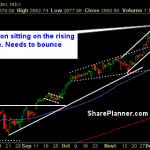Banks are closing in rural areas as they cannot afford to keep their ATM’s open in Sweden. Since Sweden is the most advanced cashless society the problems faced with cashlessness is necessary to document. It was in bad taste that the local Swedish news labeled the study Cashless Society Faces Backlash from Losers.
Suddenly, pensioners and rural dwellers are now losers? This is a very unfortunate choice of words. All you millions of people who live in rural communities worldwide could be the real losers and be considered losers in the move towards cashlessness.
The problem Sweden has is that the citizens trust the big banks, thinking they are government agencies, when in fact, they are not. The cashless movement is worldwide, certainly from Singapore to India, from Sweden to Denmark, from the UK to the USA to Israel. That means there is a connectivity to these big banks, and they all want the same thing, more profit, more fees for transactions, more control of your every move. Dollar transactions are free, and cannot be traced.

Government (specifically regulators), exists to serve the bankers said Spencer Bachus of Alabama back in 2010. There is no greater proof of this truth than to watch the efforts to form a cashless society worldwide.
In India, for example, an article entitled India’s Journey Towards a Cashless Society Has Just Begun,
the author speaks of tax incentives for Indians who make more than half their purchases through digital means. With India, it may take awhile, but the movement will be toward a cashless society.
In India, the banks will be asked to put terminals in all locations. But isn’t that scheme failing in Sweden?
In the Philippines, the government and private banks have set the goal to establish one payment center for all financial transactions. And in Denmark,the government wants to ultimately scrap cash transactions, starting in 2016.
In Singapore, a nation that is technologically advanced but prefers cash as a whole, there are plans to change all that. The goal is to eliminate all points of sale, and just have electronic self checkout. Always, cashlessness is couched in language meant to please retail, other business and government, when the movement is purely about benefiting the banks.














Leave A Comment